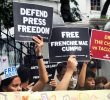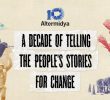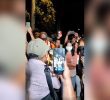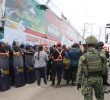*Speech of Bro. Carlito “Karl” Gaspar, Ph.D., one of this years’ Datu Bago Awardees, during the conferment ceremony on March 13, 2018 held at the Royal Mandaya Hotel in Davao City. The award is the highest honor given by the local government of Davao City to its outstanding constituents.
Honorable Sara Z. Duterte, Mayor of Davao City; members of the Sangguniang Panglungsod of Davao City; Members of the Datu Bago Awardees Organization, Inc.; my fellow awardees and past awardees; ladies and gentlemen:
Maayong udto kaninyong tanan!
The scientist, Albert Einstein, once posited that: “Time is an illusion.” The Beatles’ George Harrison, on the other hand, once said: “It’s being here now that’s important. There’s no past and there’s no future. Time is a very misleading thing. All there is ever, is the now. We can gain experience from the past, but we can’t relive it; and we can hope for the future, but we don’t know if there is one.”
If there is one element which is the reason why we are all gathered here in Mandaya Hotel today, it is the one of Time. We are taking time to celebrate. This time, it is the celebration of Araw ng Dabaw, now usually taking place on March 16. However, historical time tells us it was on March 1, 1937 – or 81 years ago – that the Charter of the city was approved. But we also know that the settlement that would rise to become this city goes back to 1848, or 170 years ago. Not as old as Manila or Cebu, or even Butuan here in Mindanao, but certainly old enough to claim is place in the country’s timeline.
1848 is of course the time when Datu Bago would enter the pages of history books. Unfortunately, current mainstream Philippine textbooks would rather mention the colonizer Oyanguren rather than this city’s equivalent of Lapu-lapu and other indigenous warriors who – even if they had not yet imbibed an anti-colonial consciousness – already foresaw the evils that would come with colonization, the impact of which continues to unfold in our midst creating all kinds of social and ecological tragedies.
If I were to speak on behalf of my esteemed co-awardees – and I can assume that they would want me to do this – I would like to thank our parents, siblings, children and grandchildren – our very own or the surrogate ones – confreres, friends and associates and everyone who have contributed to helping us forge our identities making us worthy of this award, believing that perhaps our lives have been lived in the spirit of Datu Bago.
I am truly proud to be part of this list with six other distinguished Davaoeňos who
are being honored today. Appropriating the popular symbols of this city from Mt. Apo to the Philippine Eagle, the waling-waling to the bountiful fruits and the richness of the cultures and traditions of our indigenous peoples, clearly there are parallels between the meaning of these symbols and the commitments that have brought all seven of us to where we are today. This only if we can modestly claim that we have contributed even in small ways to making this city a place where there is a little bit more kindness and compassion, recognition and respect of the rule of law and our people’s democratic rights and civil liberties, as well as genuine inclusive development and radical change.
As I have not personally known most of those in this esteemed company, it was to my delight that upon reading Carol Arguillas’ MindaNews article on who we are, that there are threads that bind us together through the years. And I guess it is for this reason that the members of the Board made their choices this year. What are these threads?
One seems to be their desire to reach out to the wounded in this city. I use the word – wounds – metaphorically of course.
Wounds can mean what is happening to the disadvantaged children and youth in our midst. Norma Javellana’s work with Tambayan, Aland David Mizeli’s Minority Care International and Nieto Vitto’s commitment to set up special education for the youth are engagements to make sure the children and youth who are victims of our society’s apathy and inequality, will also have a chance at a bright future. Like the eagle, these children can aim to soar high!
Wounds can also refer to being marginalized on account of impoverishment owing to various reasons. Belen Laud’s long engagement in cooperatives is a testament to a movement that helps us see the value of savings, allowing the poor in our midst to rise above their human degradation. Aland David’s efforts to set up a college course for those in prison is laudable because it debunks the myth that sentenced criminals no longer have a second chance at rebuilding their lives. Like Mt. Apo, they can eventually stand proud to claim their place in the world.
And lastly there are also wounds that are suffered by our Mother Earth now reeling from the impact of humanity’s disregard for the sacredness and integrity of creation. Ricardo Obenza’s engagement as environmentalist and artist, Beethoven Sur’s work with the Philippine Coast Guard Auxiliary – the lead organization of volunteers assisting the Philippine Coast Guard – in safeguarding the perilous coast of Southeastern Mindanao, Norma’s and my connection with the Interfacing Development Initiatives, Inc. (IDIS) fuel our passion for ecological advocacy. Norma also advocates for many green open public spaces so that children will be able to enjoy their right to play in a safe and healthy environment.
These efforts guarantee that Davao City’s advantage of having bountiful flowers and fruits will not fade away as the fertility of its soil and stability of its weather are assured. This is but a tribute to the wisdom of indigenous peoples who – unlike us here in the lowlands – have not lost their notions of living in peaceful co-existence with nature.
We are all called to find ways to make Davao City more inclusive in promoting the welfare of all its citizens and where all of us can say that this city is ours, that we all belong here and that each one of us has a role in making it a truly livable urban center. This is especially so because today, our city – being part of the planet – is already affected by the impact of climate change.
If there are wounds around us, the call is for healing. We are all called to take part in this great challenge to heal our families, our neighborhoods, our city, our nation and our planet from the wounds that pester in all layers of our body politic – as manifested in corruption and mediocrity, cynicism and populism, fragmentation and a continuing insurgency. We are all invited to be peacebuilders that will continue to give birth to a city by the bay where we can have a little bit of a glimpse of the promise of justice, equality, solidarity and harmony among peoples.
I leave you with this thought going back to the element of time. In my youth – which by the way was spent in this very spot where we are because our house was located there at the corner of this street – we seemed to have had the luxury of time. There was no urgency to do something really drastic and radical. But today, we are running out of time. Indeed it seems to be so true that “time slips through our hands like grains of sand, never to return again!”
So now is the moment. Carpe diem! Lets get on with the work of making sure that in this city..there is truly the abundance of life, so that we deserve the city’s mantra that LIFE IS HERE! For as Mother Teresa said: “Yesterday is gone. Tomorrow has not yet come. We have only today. Let us begin.”
Daghang salamat!




![[ANALYSIS] A different drug war](https://davaotoday.com/wp-content/uploads/2024/09/1000019103-110x100.png)





